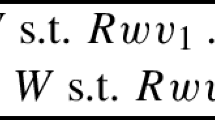Abstract
The present paper provides novel results on the model theory of Independence friendly modal logic. We concentrate on its particularly well-behaved fragment that was introduced in Tulenheimo and Sevenster (Advances in Modal Logic, 2006). Here we refer to this fragment as ‘Simple IF modal logic’ (IFML s ). A model-theoretic criterion is presented which serves to tell when a formula of IFML s is not equivalent to any formula of basic modal logic (ML). We generalize the notion of bisimulation familiar from ML; the resulting asymmetric simulation concept is used to prove that IFML s is not closed under complementation. In fact we obtain a much stronger result: the only IFML s formulas admitting their classical negation to be expressed in IFML s itself are those whose truth-condition is in fact expressible in ML.
Similar content being viewed by others
References
Andréka H., Németi I., van Benthem J.: Modal languages and bounded fragments of predicate logic. Journal of Philosophical Logic 27, 217–274 (1998)
Areces C., Blackburn P., Marx M.: Hybrid logics: characterization, interpolation, and complexity. Journal of Symbolic Logic 66, 977–1010 (2001)
Barwise J.: On branching quantifiers in English. Journal of Philosophical Logic 8, 47–80 (1979)
Blackburn P., de Rijke M., Venema Y.: Modal Logic. Cambridge University Press, Cambridge (2002)
Cameron P., Hodges W.: Some combinatorics of imperfect information. Journal of Symbolic Logic 66, 673–684 (2001)
Grädel , E., Why are modal logics so robustly decidable? in G. Paun, G. Rozenberg , and A. Salomaa (eds.), Current Trends in Theoretical Computer Science. Entering the 21st Century, World Scientific, Singapore, 2001, pp. 393–408.
Hintikka J.: The Principles of Mathematics Revisited. Cambridge University Press, Cambridge (1996)
Hintikka J.: No Scope for Scope?. Linguistics and Philosophy 20, 515–544 (1997)
Hintikka , J., and G. Sandu , Informational independence as a semantical phenomenon, in J. Fenstad, I. Frolov, and R. Hilpinen (eds.), Logic, Methodology and Philosophy of Science, number 8, Elsevier, Amsterdam, 1989, pp. 571–589.
Hodges , W., Elementary predicate logic, in D.M. Gabbay and F. Guenthner (eds.), Handbook of Philosophical Logic, number 1, Dordrecht, Reidel, 1983, pp. 1–131.
Hodges W.: Compositional semantics for a language of imperfect information. Logic Journal of the IGPL 5, 539–563 (1997)
Hodges , W., Logics of Imperfect Information: Why Sets of Assignments? in J. van Benthem, D.M. Gabbay, and B. Löwe (eds.), Interactive Logic, Amsterdam University Press, Amsterdam, 2007, pp. 117–133.
Hornstein N.: As Time Goes By: Tense and Universal Grammar. MIT Press, Cambridge (1990)
Hyttinen , T., and T. Tulenheimo , Decidability of IF modal logic of perfect recall, in R. Schmidt, I. Pratt-Hartmann, M. Reynolds, and H. Wansing (eds.), Advances in Modal Logic, number 5, KCL Publications, London, 2005, pp. 111–131.
Immerman N.: Descriptive Complexity. Springer, New York (1999)
Mann A.L., Sandu G., Sevenster M.: Independence-Friendly Logic: A Game-Theoretic Approach. Cambridge University Press, Cambridge (2011)
Rebuschi , M., and T. Tulenheimo , Between de dicto and de re: de objecto attitudes, The Philosophical Quarterly 61:828–838, 2011.
Rothstein S.: Adverbial quantification over events. Natural Language Semantics 3, 1–31 (1995)
Tulenheimo , T., On IF modal logic and its expressive power, in P. Balbiani, N.-Y. Suzuki, F. Wolter, and M. Zakharyaschev (eds.), Advances in Modal Logic, number 4, KCL Publications, London, 2003, pp. 475–498.
Tulenheimo, T., Independence-Friendly Modal Logic: Studies in its Expressive Power and Theoretical Relevance, Ph.D. thesis, University of Helsinki, 2004.
Tulenheimo T.: Hybrid logic meets IF modal logic. Journal of Logic, Language and Information 18, 559–591 (2009)
Tulenheimo , T., and M. Sevenster , On modal logic, IF logic and IF modal logic, in G. Governatori, I. Hodkinson, and Y. Venema (eds.), Advances in Modal Logic, number 6, College Publications, London, 2006, pp. 481–501.
Tulenheimo , T., and M. Sevenster , Approaches to independence friendly modal logic, in J. van Benthem, D. Gabbay, and B. Löwe (eds.), Interactive Logic, Amsterdam University Press, Amsterdam, 2007, pp. 247–280.
Vardi , M., Why is modal logic so robustly decidable? in Descriptive Complexity and Finite Models, Series in Discr. Math. & Theor. Comp. Science, number 31, American Mathematical Society, Providence, 1998, pp. 149–184.
Väänänen J.: Dependence Logic: A New Approach to Independence Friendly Logic. Cambridge University Press, Cambridge (2007)
Author information
Authors and Affiliations
Corresponding author
Rights and permissions
About this article
Cite this article
Tulenheimo, T. IF Modal Logic and Classical Negation. Stud Logica 102, 41–66 (2014). https://doi.org/10.1007/s11225-012-9462-3
Received:
Published:
Issue Date:
DOI: https://doi.org/10.1007/s11225-012-9462-3




